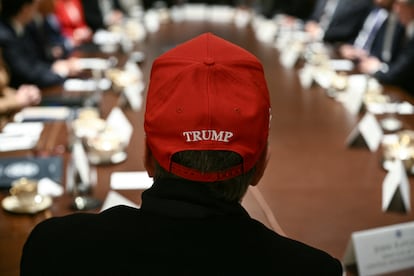Trump, a reverse Robin Hood: how to deliberately increase inequality without moving a muscle

Strictly opinion pieces that reflect the author's own style. These opinion pieces must be based on verified data and be respectful of individuals, even if their actions are criticized. All opinion pieces by individuals outside the EL PAÍS editorial team will include, after the last line, a byline—no matter how well-known—indicating the author's position, title, political affiliation (if applicable), or main occupation, or any that is or was related to the topic addressed.

The intrigue between Trump and Musk illustrates the kind of capitalism they both represent. Musk became the Republican's largest campaign donor through political action committees, organizations formed to collect financial contributions from individuals or groups and use them to support candidates, parties, or political initiatives. The Trump administration then showered some of the world's richest man's companies with subsidies. These included massive government contracts for SpaceX , tax credits and support programs for Tesla, and tax-exempt private bonuses for aerospace activities. Trump also turned the White House into a Tesla dealership by advertising for the cars in front of the press.
When the two are splitting hairs , the president threatens the businessman with suspending subsidies to companies heavily dependent on public funds: "Without subsidies, Elon would probably have to close up shop and go back to South Africa [his home country]," Trump said. Before that, for a few months (January-May), the two worked hand in hand through the Department of Government Effectiveness to streamline the administration by laying off thousands of civil servants. Then, the "biggest and most beautiful" law— The One Big Beautiful Bill Act (BBB) —has alienated them: Trump believes it is building his domestic economic policy project for the coming years (foreign policy is pending the final determination of tariffs), while Musk considers it a catastrophe for lowering taxes more than public spending, which will increase the national debt by four trillion dollars in the next decade, acting like a hernia in the American economy. The two have exchanged messages on the social media platforms they own. Musk in X: “When it comes to bankrupting our country through waste and graft, we live in a one-party system , not a democracy. Today the America Party [the billionaire’s idea to take a few votes away from Trump in Congress] is formed to give you back your freedom.” And Trump replies in Truth: “I am saddened to see how Elon has completely derailed, essentially becoming a MESS [in capital letters] over the past five weeks. He even wants to start a third political party despite the fact that he has never been successful in the US. The system is not designed for them.” Remember the cases of businessman Ross Perot or communicator and activist Ralph Nader.
The BBB makes permanent the tax cuts Trump introduced in his first term, which were set to expire at the end of this year; these are taxes that affect the upper classes much more than the middle or disadvantaged. It eliminates, at least temporarily, taxes on tips (which replace any sign of a minimum wage) and overtime pay. It also raises the country's debt limit (replacing taxes that must be paid progressively based on what one earns or owns, with debt, which must be repaid linearly); it reduces public health insurance for the poorest (Medicaid) by $900 billion, so that around 12 million citizens will lose that coverage; and it reduces the food assistance program for the neediest. It increases allocations for defense and security, including those at the borders most used by immigrants; and eliminates tax credits for clean energy.
Without mercy. Many analysts see it as the action of an inverted Robin Hood. Larry Summers, not exactly a red-blooded economist, Secretary of the Treasury under Clinton and former president of the besieged Harvard University, has described the BBB as "shameful" and an attack on the American protection system. He has compared the US economic situation to the fiscal chaos in the United Kingdom in 2022, warning of a possible "Liz Truss effect," which sought massive tax cuts offset by huge amounts of debt.
There is not a single impartial economist who believes this law is fiscally sustainable.
Do you want to add another user to your subscription?
If you continue reading on this device, it will not be possible to read it on the other device.
ArrowIf you want to share your account, upgrade to Premium, so you can add another user. Each user will log in with their own email address, allowing you to personalize your experience with EL PAÍS.
Do you have a business subscription? Click here to purchase more accounts.
If you don't know who's using your account, we recommend changing your password here.
If you decide to continue sharing your account, this message will be displayed indefinitely on your device and the device of the other person using your account, affecting your reading experience. You can view the terms and conditions of the digital subscription here.
EL PAÍS






